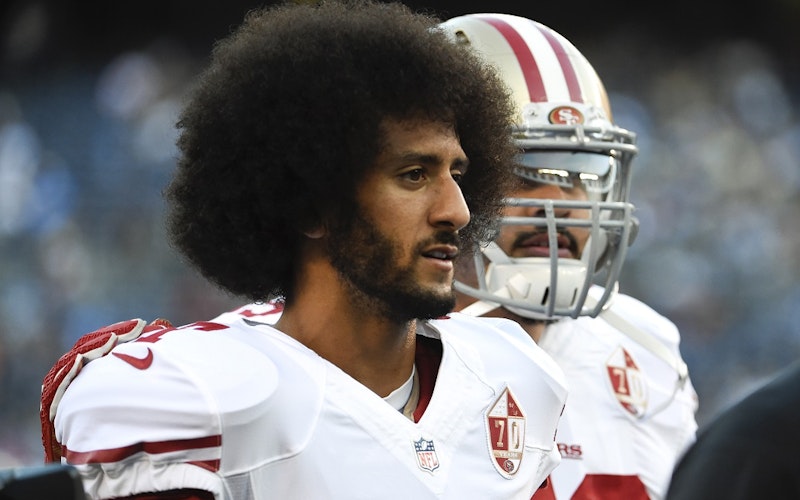
Culture At Large
Colin Kaepernick and Christian Protest
Explaining why he has been refusing to stand for the national anthem at the start of the NFL’s preseason games, San Francisco 49ers quarterback Colin Kaepernick offered this: “I am not going to stand up to show pride in a flag for a country that oppresses black people and people of color. To me, this is bigger than football and it would be selfish on my part to look the other way. There are bodies in the street and people getting paid leave and getting away with murder.”
The ensuing outcry against Kaepernick has had little to do with the many recent news stories he could be describing. It has to do with Kaepernick not bowing to power: the power of the American military, the power of idealism, and the power of what American society deems to be true sacrifice. As represented by the national anthem at the start of professional football games, this power must be revered, regardless of any inherent hypocrisy.
Kaepernick refuses to let us go through the motions. He refuses in a country that despises public refusal (see the outcry against the Black Lives Matter movement), even as our Constitution guarantees a right to refusal. It was as if Kaepernick didn’t get the memo to stand and salute openly to our star-spangled belief that we are doing the best we can in providing “liberty and justice for all.” It was as if he thought that black people and people of color deserve our full attention—right now. It was as if he expected our ideals to be a visible reality for all citizens, and not a song or salute before a game. It was as if he thought life was about more than the game itself.
Kaepernick’s protest raises a few questions for Christians to consider:
1. Should we, as Christians, spend our time debating Kaepernick’s First Amendment rights or should we be finding ways to address the reality he raises: that tax-funded police officers in America have a long and current history of oppressing and taking the lives of black and brown people while facing little consequence?
2. Is the reality that American policing can lead to death for people of color, but absolution for the officers, worth our collective protest? Is it cause for righteous anger, of the sort expressed by the likes of David, Nehemiah, and even Jesus?
3. If not for black and brown Americans facing oppression, for whom or what would you publically protest the powers that be, as Kaepernick did? How does your faith inform that decision?
For whom or what would you publicly protest the powers that be?
4. Who led Christ to the cross? Who arrested John the Baptist? Who enforced Caesar’s laws? Who pierced Christ’s flesh as he languished on the cross? Law enforcers. Can this institution not be scrutinized and called to justify itself? Why can we not sit with the discomfort this would cause?
This is the quandary of the American Christian when it comes to policing. As Jim Wallis noted, racism is America’s Original Sin. American Christians must see that the inheritance and propagation of this means that the law works for some while working against others. And if it works for you, remember that Christians are called to “defend the oppressed.” When police allegedly run “black site” detention facilities in Chicago and people like Philando Castile are gunned down after years of being accosted by police, what debate should Christians be having? What should matter more: standing while a song is played or the lives of those who live at the margins of society?
Some may look at Kaepernick and think that his protest is ill-timed, bad form, narrow-minded, or that he is not qualified to protest because of his wealth. Yet here is no such thing as the wrong time, or the wrong person, to do what is right. By using his platform to speak up for those who are continually silenced—or destroyed—Kaepernick did the only Christian thing possible in this moment: he disregarded the title, platform, and wealth that power has provided and instead remembered the Beatitudes. He spoke for those in jail, those in the ghettos, and those without true justice, who have forever existed as the case study for American hypocrisy. And America has largely responded as it often does when it comes to people of color: with a collective call to silence the messenger.
Topics: Culture At Large, Arts & Leisure, Sports, Theology & The Church, Faith, News & Politics, Justice, North America